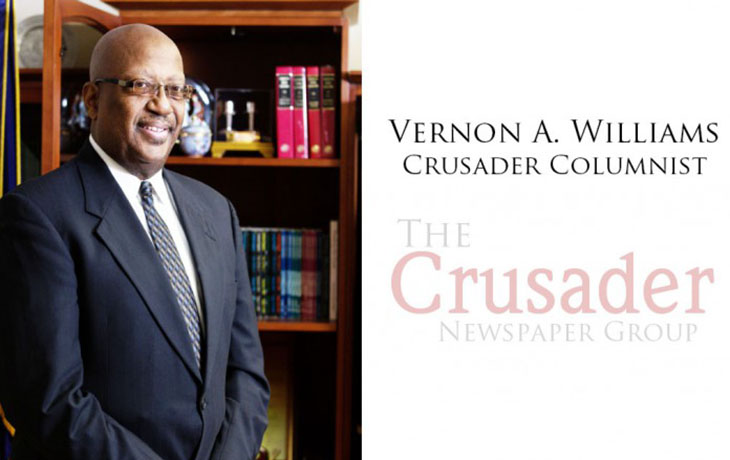by Vernon A. Williams
More than 150 years later, Black and White can make the holiday a teachable moment
Let’s keep it real. Ten years ago, no five years ago, Juneteenth Day was barely a thing in the Black neighborhood, much less among Whites. Nothing to be ashamed of to admit that most just weren’t locked in to that as a day to circle on the calendar.
Now, don’t get me wrong. There have always been dedicated groups of organizers in virtually every city with a Black population who insisted on doing something to commemorate the occasion. But it wasn’t hard to get a ticket to that event.
Sincere as their efforts were and on target as their motives to sustain a critical part of a legacy, most people just didn’t take the time to prioritize the event enough to make it a staple on their annual calendar of events.
Of course, it didn’t help that most schools and colleges were out for the summer by then and it clashed with Father’s Day.

Don’t beat yourself up about it. You are in the majority if you are just now getting a real grip on why the day is to be observed. And even with all the facts, personally I wonder if we might put a different slant on it than the most broadly held interpretations. I will explain later. It’s only fair to first share some facts that by now, most of your already know.
Officially known as Emancipation, Juneteenth Independence Day and Freedom Day, Juneteenth is portmanteau—a blending of the month and date —for June and 19 to commemorate the day in 1865 that marked the abolition of slavery and the emancipation of enslaved Americans throughout the Confederate South.
Though President Abraham Lincoln signed the Emancipation Proclamation in January of 1863, Texas being Texas even way back when, it was another two and a half years before word reached that perennially backward state. Union troops reached Galveston, Texas and discovered this dastardly negligence.
Why was Texas last to end the most shameful chapter in American history? While there are many theories, arguably the most likely is those people who called themselves slave owners (for lack of a better term, since no person can actually own another human being) simply ignored the news and wanted to stretch this travesty out as long as they could.
The annual commemoration was started as a stabilizing and motivating factor in the lives of African Americans who boldly wanted to claim their new status despite the fact that in spite of the newly-proclaimed freedom, they still faced many uncertainties and challenges.
From the outset, celebrations included parades, storytelling, cookouts and outdoor games. Many across the country will emulate those activities this week.
However well-intended some lawmakers, I can’t help but be suspicious of the motives of House of Representatives (where only 14 Republicans voted against making Juneteenth a federal holiday, and the Senate where the vote was 99-0 in favor of the measure. This seems an eerie, unlikely even though short-lived coalition of left and right. If it was that simple, there would be something done by now on gun control. But I digress.
The truth is that the federal holiday—which you can be certain won’t be observed among people who don’t even want to teach children about slavery—was a symbolic act to access the proverbial low-hanging.
Be cautious of applauding legislatures that prefer to give Americans an extra day off rather than equitable voting rights, rights for women to decide what to do with their own bodies, dollars for crumbling urban war zones over Ukraine.
And the next time Rand Paul, Ted Cruz, Marco Rubio, Mitch McConnell et al, initiate some thoughtful, sustainable action with significance to Black America will be the first time. How can we validate their sincerity when they join those who lead the charge against Critical Race Theory which, among other things, provides truthful history to inform young people of enslavement in the U.S. These Republicans have no such love or concern.
Increasingly, major institutions, civic, social, community and government are at least giving perfunctory acknowledgement of Juneteenth. Some are doing it much larger in their cities and communities.
And like I said at the outset, five or 10 years ago, Juneteenth wasn’t even widely observed, not even among Blacks. So anything that facilitates the opportunity to broaden knowledge and perspectives is important.
Seize the moment. Make this about teaching and organizing to confront real issues involving people of an Africana Diaspora.
Let’s celebrate the past, commit to the work of the present day, then design and implement effective strategy for our future —one state, one city, one neighborhood, one church, one school, one classroom, one household, and one family member at a time. Happy Juneteenth!
(CIRCLE CITY CONNECTION by Vernon A. Williams is a series of essays on myriad topics that include social issues, human interest, entertainment and profiles of difference-makers who are forging change in a constantly evolving society. Williams is a 40-year veteran journalist based in Indianapolis, IN—commonly referred to as The Circle City. Send comments or questions to: vernonawilliams@yahoo.com.)